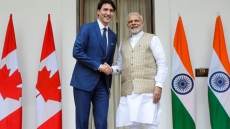India had an estimated 1.16 million new cancer cases in 2018, according to a report by the World Health Organisation (WHO), which said that one in 10 Indians would develop cancer during their lifetime and one in 15 would die of the disease.
Ahead of the World Cancer Day on Tuesday, WHO and its specialised International Agency for Research on Cancer (IARC) have released two reports: one aimed at setting the global agenda on the disease; the other focused on research and prevention.
The World Cancer Report said that according to the estimated cancer burden in India in 2018, there are about 1.16 million new cancer cases, 7,84,800 cancer deaths, and 2.26 million 5-year prevalent cases in India’s population of 1.35 billion.
The report said that “one in 10 Indians will develop cancer during their lifetime, and one in 15 Indians will die of cancer”.
In India, the six most common cancer types were breast cancer (1,62,500 cases), oral cancer (1,20,000 cases), cervical cancer (97,000 cases), lung cancer (68,000 cases), stomach cancer (57,000 cases), and colorectal cancer (57,000). Together, these account for 49 per cent of all new cancer cases.
Of the 5,70,000 new cancer cases in men, oral cancer (92,000), lung cancer (49,000), stomach cancer (39,000), colorectal cancer (37,000), and oesophaegal cancer (34,000) account for 45 per cent of cases.
The report added that of the 5,87,000 new cancer cases in women, breast cancer (1,62,500), cervical cancer (97,000), ovarian cancer (36,000), oral cancer (28,000), and colorectal cancer (20,000) account for 60 per cent of cases.
“Cancer patterns in India are dominated by a high burden of tobacco-related head and neck cancers, particularly oral cancer, in men and of cervical cancer in women; both of these cancer types are associated with lower socioeconomic status,” the report said.
The burden of cancer types, such as breast cancer and colorectal cancer, associated with overweight and obesity, lower levels of physical activity, and sedentary lifestyles is increasing and these cancer types are associated with higher socioeconomic status.
“During the past two decades, India has had one of the world’s best performing and most stable economies, which has grown by more than 7 per cent annually in most years.
“This economic development has given rise to vast socioeconomic changes, with an increasing risk of non-communicable diseases, including cancer, and significant disparities in access to cancer prevention and control services,” the report said.
WHO warned that global cancer rates could rise by 60 per cent over the next 20 years unless cancer care is ramped up in low- and middle-income countries. Less than 15 per cent of these nations offer comprehensive cancer treatment services through their public health systems, according to the UN agency.
“At least 7 million lives could be saved over the next decade, by identifying the most appropriate science for each country situation, by basing strong cancer responses on universal health coverage, and by mobilising different stakeholders to work together,” WHO Director-General Tedros Adhanom Ghebreyesus said.
The report said about 80 per cent of the world’s smokers lived in low- and middle-income countries. In addition, 64 per cent of the world’s daily smokers lived in only 10 countries and more than 50 per cent of the world’s male smokers lived in three countries: China, India and Indonesia.
There are currently 164 million users of smokeless tobacco, 69 million smokers, and 42 million smokers and chewers in India. More than 90 per cent of patients with oral cancer have low or lower-middle socioeconomic status. Tobacco-related cancers account for 34–69 per cent of all cancers in men; they constitute 10–27 per cent of all cancers in women in most regions in India.
The incidence of colorectal cancer is increasing in the most developed states in India and in urban populations.
“There is a clear increasing trend in the incidence rates of breast cancer across the country, with an annual percentage increase that ranges from 1.4 per cent to 2.8 per cent and is more pronounced in urban areas than in rural areas. Incidence rates are also increasing for cancer types associated with overweight and obesity and lower levels of physical activity, such as colorectal cancer, uterine cancer, ovarian cancer and prostate cancer.”
The report noted that there is a clear decreasing trend in the incidence rates of cervical cancer in most regions in India (annual percentage change, -2.0 per cent to -3.5 per cent), with age-standardised incidence rates as low as 6 per 1,00,000 in women in Kerala.
India accounts for about one-fifth of the global burden of cervical cancer, despite decreasing incidence rates in several regions of the country.
“Thus, elimination of cervical cancer in India will have a major impact on global elimination of the disease as a public health problem. Cervical cancer disproportionately affects women with lower socioeconomic status, who are at a considerable disadvantage in the availability of and access to public health services for prevention and early detection, and, therefore, this is an equity issue.
IARC Director Elisabete Weiderpass observed that high-income countries had adopted prevention, early diagnosis and screening programmes, which together with better treatment, had contributed to an estimated 20 per cent reduction in the probability of premature mortality between 2000 and 2015, but low-income countries only saw a reduction of five per cent.
